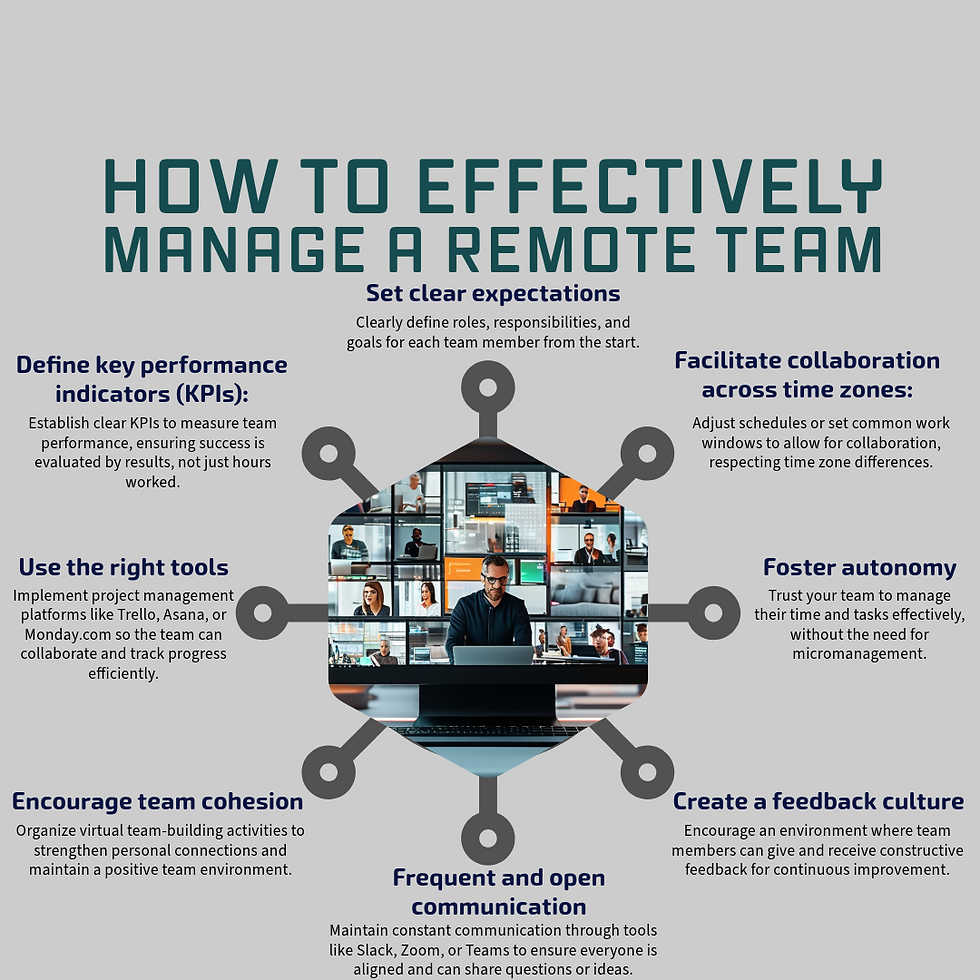The Impact of Remote Work on Project Management: Challenges and Best Practices
- NexWins Pulse

- Oct 4, 2024
- 3 min read
Remote work has radically transformed the way projects are managed, offering flexibility and access to a global talent pool. However, it has also brought a series of specific challenges that project management teams must overcome to maintain efficiency, communication, and control over deliverables. Below, we explore the main challenges of remote work in project management and how to address them, as well as best practices that maximize its advantages.

Challenges of Remote Work in Project Management
1. Lack of Effective Communication and Collaboration
One of the biggest challenges in remote project management is communication. With team members spread across different time zones and cultural contexts, maintaining fluid and efficient communication can become complicated. This affects project leaders' ability to coordinate tasks, resolve issues, and ensure alignment of objectives.
Solution: Implement robust collaboration tools and establish mandatory communication schedules. Platforms like Slack, Microsoft Teams, or Zoom allow teams to stay connected in real-time, while shared documentation tools (Google Docs, Notion) facilitate asynchronous collaboration. Additionally, it's advisable to set up daily standup meetings and more extensive weekly check-ins to ensure alignment.
2. Difficulty in Monitoring Project Progress
When teams work remotely, it can be more challenging for project managers to monitor progress in real-time. The lack of visibility into how team members are advancing can lead to delays and a lack of accountability.
Solution: Utilize project management tools like Jira, Trello, or Asana that allow detailed tracking of each task, from assignment to delivery. Dashboards provide project managers with a comprehensive view, while automated notifications keep everyone informed of changes or progress.
3. Isolation and Lack of Team Cohesion
Remote work can make team members feel isolated, affecting their morale and productivity. The absence of face-to-face interaction can also limit the building of trust-based relationships among team members.
Solution: Encourage virtual team-building activities and promote socialization through online events. Implementing feedback meetings where all members can share their experiences and concerns is also beneficial. Tools like Donut in Slack help foster informal connections, and organizing events outside of work, even virtually, reinforces team cohesion.
4. Challenges in Managing Security and Confidentiality
Working remotely involves accessing data and files from various networks, increasing cybersecurity risks. Companies handling sensitive information may face challenges ensuring employees adequately protect that data.
Solution: Implement strict cybersecurity policies and train employees to understand the risks. This includes using VPNs, two-factor authentication, and secure storage platforms. Conducting regular audits to ensure compliance with these measures is also important.
Best Practices for Managing Projects in Remote Environments
1. Leverage Flexible Hours
Remote work allows teams to adjust their schedules to peak productivity times rather than adhering to a fixed 9-to-5 framework. This not only improves work quality but also enhances employee satisfaction.
Advantage: By allowing teams to work during their most productive hours, project efficiency improves. Additionally, employees feel more empowered, which enhances talent retention.
2. Hire Global Talent
With remote work, geographic restrictions no longer apply. Project managers can access a global talent pool, opening the door to finding the most suitable skills for each project, regardless of location.
Advantage: This not only increases team diversity, enriching creativity and innovation, but also allows for cost reductions by hiring talent in regions with more competitive salaries.
3. Increase Productivity Through Digital Tools
The use of digital tools becomes key in the remote environment. From project management platforms to collaboration software, these tools enable an agile and centralized workflow that facilitates project execution without friction.
Advantage: Digitalizing management and collaboration tasks not only reduces execution times but also ensures that all involved are aware of what is happening in real-time, avoiding misunderstandings and errors.
4. Promote a Culture of Trust and Autonomy
In a remote environment, it's essential to trust employees to fulfill their responsibilities without constant oversight. This means that project leaders must foster a culture where employees have the autonomy to make decisions and solve problems independently.
Advantage: Granting autonomy empowers employees to be proactive and take ownership of their tasks, improving motivation and long-term efficiency.
Conclusion
Remote work has changed the landscape of project management, presenting both challenges and opportunities. By addressing and resolving communication, tracking, cohesion, and security challenges, project managers can fully leverage the advantages offered by this new way of working. With best practices in place—such as flexible hours, global hiring, and trust in the team—it is possible to achieve success in remote projects effectively and sustainably.
%20-%20PNG%20OK.png)


Comments